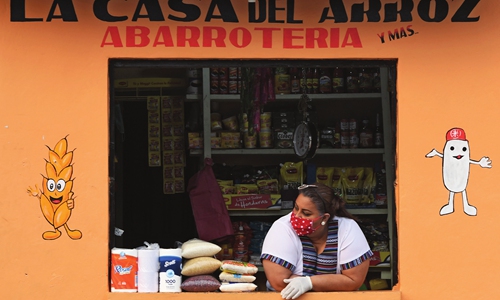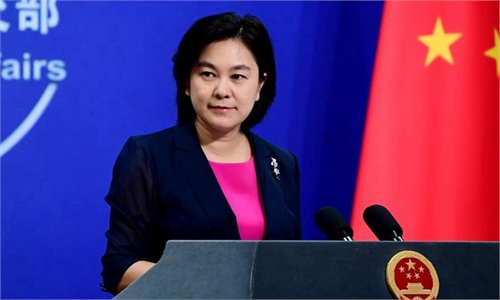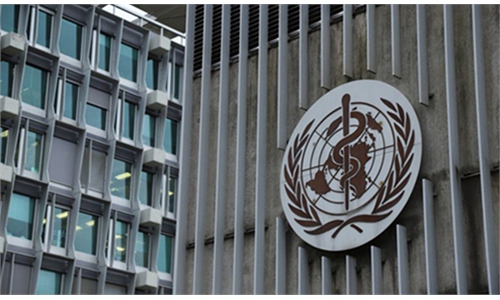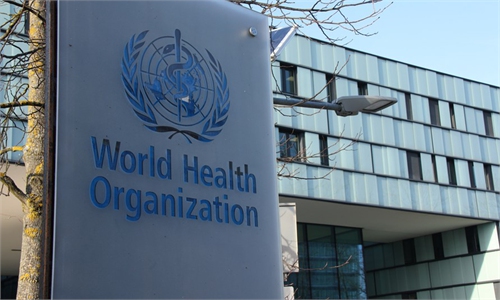
A woman wears a face mask and gloves as she waits for customers at a store in Tegucigalpa, Honduras on Wednesday, amid the new coronavirus pandemic. Honduran authorities confirmed 510 cases of COVID-19 and 46 deaths from it. Photo: AFP
Honduras, one of the last 15 countries and regions that keep "diplomatic ties" with the island of Taiwan, said Monday that its neighboring country El Salvador will help it to get the Chinese mainland vaccines as the COVID-19-hit country in Central America is struggling with a shortage.
The Global Times learned from a source on Tuesday that the Chinese Embassy in El Salvador is dealing with the case, but without the embassy's confirmation that the embassy has received any vaccine-related request from El Salvador as of press time.
El Salvador cut "diplomatic ties" with the island of Taiwan in 2018. Honduras, which has no diplomatic ties with the Chinese mainland, is regarded as an ally of the island of Taiwan under pressure from the US.
Some analysts believe the balance is tilting in China's favor when Honduras said neighboring El Salvador will help break a "geopolitical blockade" and buy vaccines from the Chinese mainland through a Twitter post of its health authority.
The island has 15 "diplomatic allies" - eight from Central America and the Caribbean. The island responded on Tuesday that it has a firm friendship with Honduras and opposes the provision of vaccines by any party with implicit conditions as a means to undermine their ties.
Zhou Zhiwei, an expert on Latin American studies at the Chinese Academy of Social Sciences, told the Global Times on Tuesday that these countries are willing to establish diplomatic relations with the Chinese mainland, as the dividends of cooperation with China are obvious. However, under pressure from the US which plays the "Taiwan card," they cannot conduct normal exchanges with China.
Experts also take El Salvador as an example to show how the US set obstacles for the remaining Taiwan "diplomatic allies" when they sought to strengthen cooperation with the Chinese mainland. Aside from expressing concerns and disappointment after El Salvador shifted to Beijing in 2018, the US threatened to cut its aid to the country, media reported.
China has provided vaccines to at least 12 Latin American countries and donated over 34 million pieces of urgently needed medical supplies and equipment to 30 countries in the region, media reported. The Financial Times recently reported that China has shipped more than half of the 143.5 million doses of vaccines to the region's 10 most populous nations.
Less than 0.1 percent or 2,639 people in Honduras have been fully vaccinated, as the country recorded 897 new COVID-19 cases on Monday. Some analysts said Honduras' hopes are largely pinned on the Chinese mainland vaccine, especially as the US hoards its own vaccine and Covax distributes insufficient amounts.
Wang Youming, director of the institute of developing countries at the China Institute of International Studies in Beijing, told the Global Times on Tuesday that the vaccine issue is not enough to push Latin American countries to abandon Taiwan, but the trend toward the Chinese mainland is already clear.
China has long stated that COVID-19 vaccines are international public health products and priority should be given to helping hard-hit developing countries. However, Honduras has not established diplomatic ties with China, and no country will give priority to countries that have not established diplomatic ties, Wang said.
China is eager to realize the multi-field cooperation and normalization of relations with all Latin American countries, which is based on the concept of a community with a shared future for mankind in the face of common global public health challenges, Zhou said.
As for China, vaccine and medical cooperation through third countries could be a new channel to help countries without diplomatic ties in the future, Zhou said.




